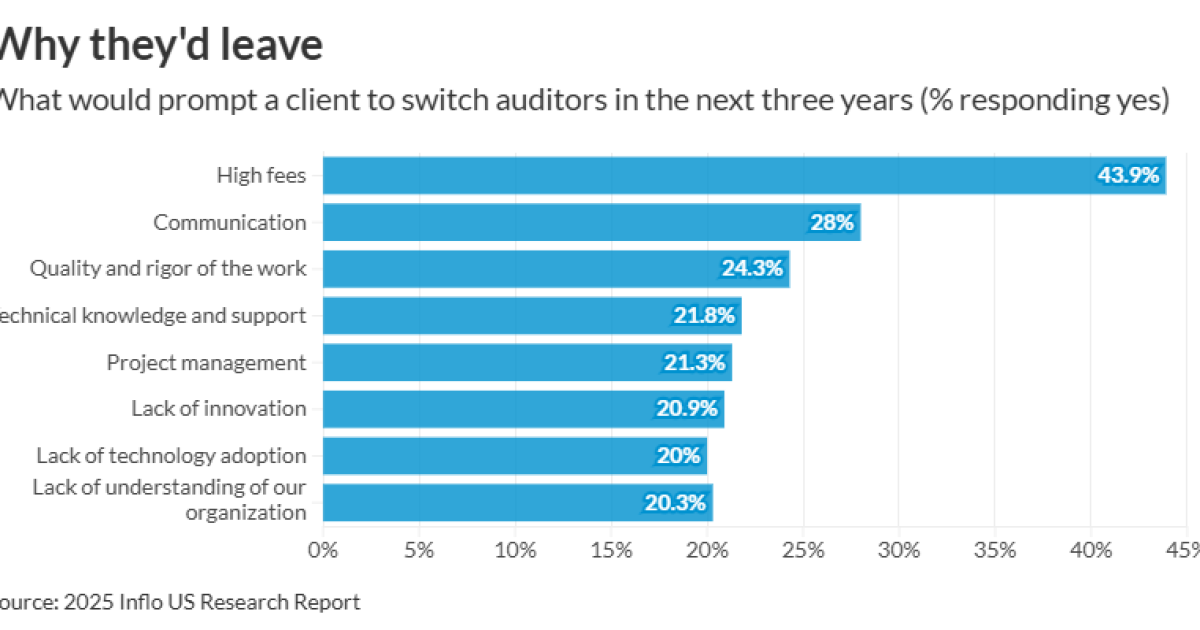I am optimistic about the “trusted advisor” destination that the accounting profession has marked as its territory, but skeptical of the partnership model as a means of transportation to that promised land. Why? It has to do with young, talented people in public accounting, and the choices that I see them make when they are equipped with complete information.
In growing my firm, Ascend, over the last two years, I have invested thousands of hours in conversation with managing partners and executive committees. During these discussions, I have heard many firm leaders that I admire advocate on behalf of their brightest young people: “Lisa is a rockstar … how is partnering with you going to be better for her?”
I have likewise sat in conferences where industry thought leaders proclaim private equity as “the best thing that could happen to young people;” from eyeballing it, the median age in those rooms approached 60! It is encouraging that rising stars of my generation have collectively become the object of deep concern and spirited debate as the profession learns to surf a wave of capital that is challenging tradition, but frankly, it is a shame that young leaders often lack access to the context that would allow them to form their own view and participate in conversation directly.
That needs to change. So, “Lisa,” if you are out there, I am speaking directly to you. You and other young, talented people of our generation need information to plan for your own future, not a scripted ending penned by someone else with positive intent. Getting up to speed involves confronting the challenges of the partnership model, building awareness of alternatives, and thinking about how you should engage in discussion, once you feel informed. Here’s a crash course.
What is happening to the partnership model?
To start, ownership in a CPA firm is more expensive today than it ever has been. There is more than $15 billion of private capital (more than 1x revenue for the remaining, independent G400) that has decided an ownership stake is worth more than what your firm’s partnership agreement says it is.
The offer on display from smart money is tempting — access to liquidity much sooner, with better tax treatment, and the chance for “multiple bites at the apple,” with resources to fuel future value creation. While a growing list of firms have opted into that deal, others still have chosen to hold steady to independence; in doing so, fiercely independent firms are beginning to reprice their partnership agreements to bridge this widening gap between the market valuation of a CPA firm and the discount that has historically been used for internal succession.
What does that mean for you? Partner buy-ins will become more expensive and look-back provisions that allow retired partners to eat into a future sale of the firm will become more common. Young people, your partnership may persist, but the older generation isn’t going to cede all surplus economic value to you forever. It is going to cost more to become an owner, and you need to be prepared for that eventuality.
At the same time, maintaining independence is getting costlier. Independence has long been a virtue of our profession, but make no mistake, it has never been free — growth, fueled by a strong value proposition to clients and employees, is what has propped up the independent partnership model as a way of serving others, organizing talent, and creating wealth for many generations.
Historically, this has taken periodic reinvestment to sustain — hiring talent from competitors before clients follow; putting up working capital to tuck in a new firm; sampling a la carte technology products like SafeSend and Aiwyn that hit the market. Sadly, this window-shopping pace of reinvestment is not going to cut it anymore. Our profession is navigating a rapidly changing backdrop, which is calling for expensive, transformative change in a compressed period.
Here’s what I mean: If you take the time to forecast the next 10 years of public accounting supply (i.e., credentialed CPAs in America) and demand (i.e., U.S. total addressable market), the well-documented conclusions are:
- 75% of today’s CPAs will have retired in the next decade; and,
- Revenue per CPA is projected to 2.7x during that period, because new entrants are declining.
That alone is the most precipitous change in labor dynamics since these statistics have been tracked. What is less covered, but equally important, is that 10 years from now, more than 85% of CPAs in America will have less than 10 years of experience. Think about that: We need to achieve a 2.7x growth in personal productivity, with nine in 10 professionals having less than a decade of experience. What does a 10-year person do in your firm today? Can they drink a tsunami from a fire hose?
It all begs the question of how firm leaders are going to respond to this market-driven reality. Build a global team that can go toe to toe with U.S. CPAs on technical expertise and client service? Automate away half our billable hours? Rebuild a professional development curriculum with “Lean” manufacturing principles to cut partner cook time from 20 years to 10? All the above?
It can be done, and the market share opportunity for firms that do this successfully is hard to overstate, but these initiatives take many millions of dollars to pursue, functional expertise to get right, and deep commitment to test, learn and, ultimately, produce results.
If you are on the outside of a partnership looking in, take a step back with clear eyes and you’ll see that you are being taxed twice for entry: once to purchase your ownership stake relative to its historical cost, and once more to make investments in your firm that are greater than ever before required, at a pace that’s unprecedented, without a guarantee of paying off.
There are some important questions to ask as you take stock of this reality: Have you talked about how much this will cost? Would your firm be effective at deploying the money you choose to set aside? Will today’s senior partners share in the cost with you, and start now? Are you willing to spend the money for the chance of an ordinary income payout between ages 65 to 75, at a discount to the then-market price? Given how these trends affect your ability to win talent, how will you guarantee that someone will stand behind you in 25 years to make the same bet you are making today?
These questions should be discussed broadly. You may have satisfying answers, but to make forward progress as a firm, your partner group must agree with you, and there is no time to waste.
What is the alternative?
If you don’t want to merge your firm into another, the primary alternative to going it alone is to trade in the keys to your unfunded partnership for private equity backing. To offer a pithy comparison, partnering with private equity has several advantages relative to your status quo:
- Important investments are made with other people’s money;
- Corporate governance permits faster decision-making at a moment where pace matters;
- The economic model is more efficient, and can be more generous: equity participation happens earlier; ownership always trades at a market price; liquidity is more frequent and tax-advantaged;
- All of this done right creates a better place to work, and the flywheel turns; and,
- Other industries show us that the flywheel can turn indefinitely.
And yet, these easily understood benefits are subject to valid lines of inquiry from those peering in:
- If ownership changes hands frequently, who is to say the ride will be smooth?
- Are incentives aligned in a way that upholds quality standards?
- How should I sort through all the different forms of private equity that exist (local equity versus parent equity; minority versus majority, dealing with PE directly versus through an operating company like Ascend; etc.)?
All good questions, especially because not all private equity is created equally. These pros and cons can only be weighed appropriately through education, and there would be much more to discuss.
Where to go from here?
Get your seat at the table. My purpose in writing is not to drive you to a specific conclusion, but instead to give you the context needed to form your own.
If you are on a path to becoming an owner in your firm, you are committing (consciously or not) to what is becoming one of the more expensive investments in the U.S. economy. I understand how busy practitioners are, but it is worth knowing if you are positioned to realize a return on that investment via the partnership model.
You can do that by:
- Demanding clarity on your firm’s direction;
- Seriously assessing the “how” behind the vision that is shared with you; and finally,
- Encouraging leadership to explore options, which I have found to sharpen thinking regardless of a firm’s ultimate decision around go-it-alone versus sponsorship.
Our generation is the one that will navigate this sea change in public accounting. Create the time to underwrite your future and make your opinion known.


 Blog Post1 week ago
Blog Post1 week ago
 Economics1 week ago
Economics1 week ago
 Finance1 week ago
Finance1 week ago
 Accounting1 week ago
Accounting1 week ago
 Personal Finance7 days ago
Personal Finance7 days ago
 Personal Finance1 week ago
Personal Finance1 week ago
 Personal Finance1 week ago
Personal Finance1 week ago
 Finance1 week ago
Finance1 week ago










